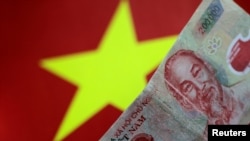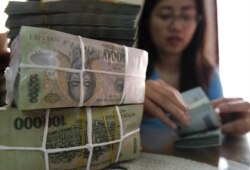Analysts say this month’s U.S. designation of Vietnam as a currency manipulator will spur talks between the two countries that could see Vietnam buy more U.S. goods or reduce government intervention in the foreign exchange rate.
The designation came about because the U.S. Treasury Department determined, according to its semiannual report on major U.S. trading partners’ macroeconomic and foreign exchange policies, that Vietnam – as well as Switzerland – is a currency manipulator. The department determined that Vietnam’s currency was undervalued by 4.7% in 2019.
In announcing the decision, Treasury said it found each country’s exchange policies over the year through June were at least partly aimed at preventing effective balance of payments adjustments and, for Vietnam, “for gaining unfair competitive advantage in international trade as well.”
In announcing the decision, Treasury said it would follow up the report with talks to include urging steps to address the causes of currency undervaluaton.
Vietnam had racked up a trade surplus of $54.4 billion in 2019, another irritant to the United States.
Vietnam’s central bank rejected the U.S. accusation that it manipulates its currency.
The country’s exchange rate “has been designed to serve the consistent goal of controlling inflation and stabilizing the macro-economy, not to gain an advantage in global trade,” Vietnam’s State Bank said December 17, as cited by VGP News, the government’s online newspaper.
Vietnam's low exchange rate means Vietnamese companies selling goods to the United States earned more Vietnamese dong from the dollars they received from U.S. customers, while American exporters would pay more to exchange dong.
Vietnam and the United States are expected to reach a currency-related agreement over the next year, two experts said. The two sides get along politically today despite old baggage from their war that ended in the 1970s.
“Basically, it’ll now be a period where the U.S. will have discussions with Vietnam to try to resolve the situation,” said Rajiv Biswas, a senior regional economist with IHS Markit, a London-based market analysis firm. In Washington, he said, “They won’t immediately just start taking action in terms of policy measures.”
Hanoi might agree to buy more U.S. goods or intervene less in its foreign exchange rate and let the free market decide, experts say. Inaction by Vietnam over the next year could prompt U.S. officials to levy import tariffs.
About a quarter of Vietnam’s economy rests on exports, the result of low manufacturing costs and government incentives to promote foreign investment by the likes of Ford, Intel and Samsung Electronics.
Vietnamese exports include smartphones as well as garments, shoes and automotive parts. The United States was Vietnam’s top trading partner in 2019 in both imports and exports.
Other countries labeled currency manipulators have patched things up with the United States by agreeing to buy American products. Taiwan, for example, was reportedly planning more purchases of U.S. goods late last year to reduce its U.S. trade surplus and avoid being labeled a manipulator.
In February 2019, Vietnam-based budget carrier Vietjet Air agreed with U.S. aircraft manufacturer Boeing to buy 100 additional 737 MAX planes.
“Once Boeing gets its MAX planes in order, Vietnam will order more,” said Jack Nguyen, a partner at the business advisory firm Mazars in Ho Chi Minh City. “We made a huge order to Boeing, so we’re trying to balance the trade.”
The United States dubbed China a manipulator in August 2019 but removed that label in January of this year after China agreed to an initial trade deal auguring well for American businesses.
Hanoi and Washington will probably start talks toward an “enhanced bilateral engagement” calling on Vietnam to do something with its currency rate and “address any significantly large trade surplus with the U.S.,” SSI Research of Hanoi said in a December 21 summary of economic trends in Vietnam.
Vietnam’s central bank has said it's willing to work with Washington.
"The country is also willing to coordinate with the U.S. side to discuss relevant issues based on the spirit of cooperation and mutual benefits, towards fair and harmonious commercial ties between the two sides," VGP News said.
Vietnam would find it hard to snap up a lot of American imports or bring down the trade gap in the near term, Biswas said. It would be easier for now, he said, to intervene less in the foreign exchange rate.
China, like Vietnam, depends heavily on manufactured exports and its communist government controls the currency exchange rate. China and the United States are separately entrenched in a trade dispute that has sent tariffs soaring on both sides since 2018.
U.S. President Donald Trump is not personally targeting Vietnam, scholars believe, though American officials are warily watching Vietnam as a place where China-based factories have relocated to avoid tariffs tied to the Sino-U.S. trade dispute.
From the U.S. side, “this is perhaps just a little sort of a warning to Vietnam to not enjoy the benefits of supply chain too much,” said Song Seng Wun, an economist in the private banking unit of Malaysian bank CIMB.








